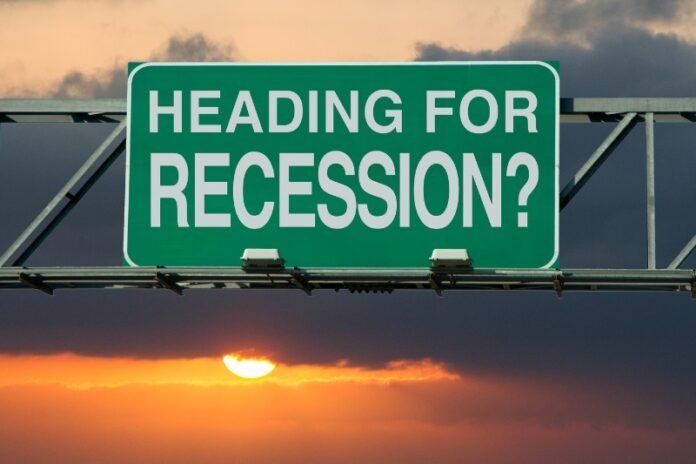Recessions can lead to some scary economic times as share prices plummet and job losses mount, but there are some strategies for how to profit in a recession.
You’ll want to make sure you have a diversified portfolio that spans different asset classes, industries, and markets.
You should look to long-term investments so that you can profit as the economy expands after the recession.
There are also several options for so-called haven investments – companies or industries that remain relatively stable during a recession.
Although there are no real “recession-proof” investments, there are several ways you can mitigate your losses or perhaps even gain a little during a recession.
Understanding Recession and Its Impact on Investing
-
What is a recession?
A recession is a widespread and significant downturn in the economy. They usually last for several months or perhaps years, although the 2020 recession prompted by the Covid pandemic lasted only two months.
A common marker of a recession is two consecutive quarters of negative GDP growth.
The National Bureau of Economic Research (NBER) also defines it as “a significant decline in economic activity spread across the economy, lasting more than a few months, normally visible in GDP, real income, employment, industrial production and wholesale-retail sales.”
-
How recessions affect the economy and investments
Markets generally contract at the start of a recession as the price of many shares plunge dramatically. This is particularly true with cyclical investments.
This is usually followed by a bear market, which is a prolonged dip in investment prices – when a broad market index falls by 20% or more.
As the demand for goods and services slows, unemployment can be a key feature of a recession. As companies cut their workforce, demand drops further which can lead to more layoffs.
-
Historical trends during recession
Recessions can usually last several months to a couple of years and are usually followed by a prolonged period of growth along with a bull market, a prolonged growth of the stock market.
The average recession in the U.S. has lasted 17 months, based on an analysis of data going back to 1857 from Investopedia.com. Six recessions since the 1980s have averaged less than 10 months.
Strategies for achieving financial stability through recession-proof investments.
-
Diversification
One of the best ways to avoid the worst effects of a recession is to make sure you have a diversified portfolio of investments.
This means investing in several different asset classes – having equities, real estate, and bonds – as well as investing in various sectors.
It is also wise to invest in different markets so all of your money isn’t based in the U.S., for example.
This helps to spread the risk and potential damage from a recession.
If you’re entirely focused on one industry and it gets hit particularly hard, you’ll lose a whole lot of your money. If that industry makes up only a small part of your investment, you’ll be much less affected.
-
Long-term investments
One of the best ways to recession-proof your investments is to make sure you’re investing and focused on the long term.
Recessions don’t last forever so even if the markets drop by 15%, they’ll eventually go up again. Selling after prices have plunged isn’t a wise investment strategy.
It can be wise to buy during a recession as share prices are lower. However, the so-called plan of “buying the dip” can be difficult to time and is generally considered a risky strategy.
Investing in the long term is more challenging as you are near retirement age but remember that you don’t need all your money when you quit working. You should make sure that you have some money in liquid, low-risk investments.
-
Safe-Haven Investments
One of the most commonly cited recession-proof investments comes in the form of safe haven investments or core sector stocks. These are industries or companies that remain in demand despite how poor the economy is doing.
Healthcare stocks are usually considered relatively recession-proof because people can’t defer these costs. You can tighten your financial belt by eating out less frequently but if you get sick, you’re going to see a doctor and buy medicine.
Consumer staples are another one.
People will tend to eat out less, but they still need to eat some investing in grocery stores and packaged food makers can be a wise move.
The same goes for household and personal products.
Utility companies can be another recession-proof investment. Demand for electricity, water, waste collection and natural gas can be expected to remain relatively normal throughout a recession.
You should also think about cost-conscious retail stores like Walmart or Dollar General.
People will often choose to spend money at home by renovating their houses so home improvement outlets can be a safe bet.
Evaluating investment opportunities
You should always make sure that your investments match up with your overall financial plan.
If you’re a long-term investor who doesn’t need any of the money right away, it can be helpful to invest in higher-risk equities, for example.
If you’re nearing retirement age, you probably want to keep a portion of your money in relatively safe investments like bonds so that you have a guaranteed amount to live on. The rest you can devote to riskier investments.
You should also only invest in money that you don’t need immediately. You should always keep an emergency fund of 2-3 months of living expenses before putting any money markets. This is particularly true during a recession when layoffs are rampant.
It’s also important to keep a cool head during a recession. Markets will almost certainly contract, and share prices will drop. Panic selling will just lock in your losses.
Conclusion
There are ways to achieve financial stability during a recession, namely with diversification, long-term investments, and core sector stocks.
Remember that recessions are relatively short-lived so there is light at the end of the tunnel.
Must Read: Tips For When Your Investment Portfolio Starts to Grow






























































